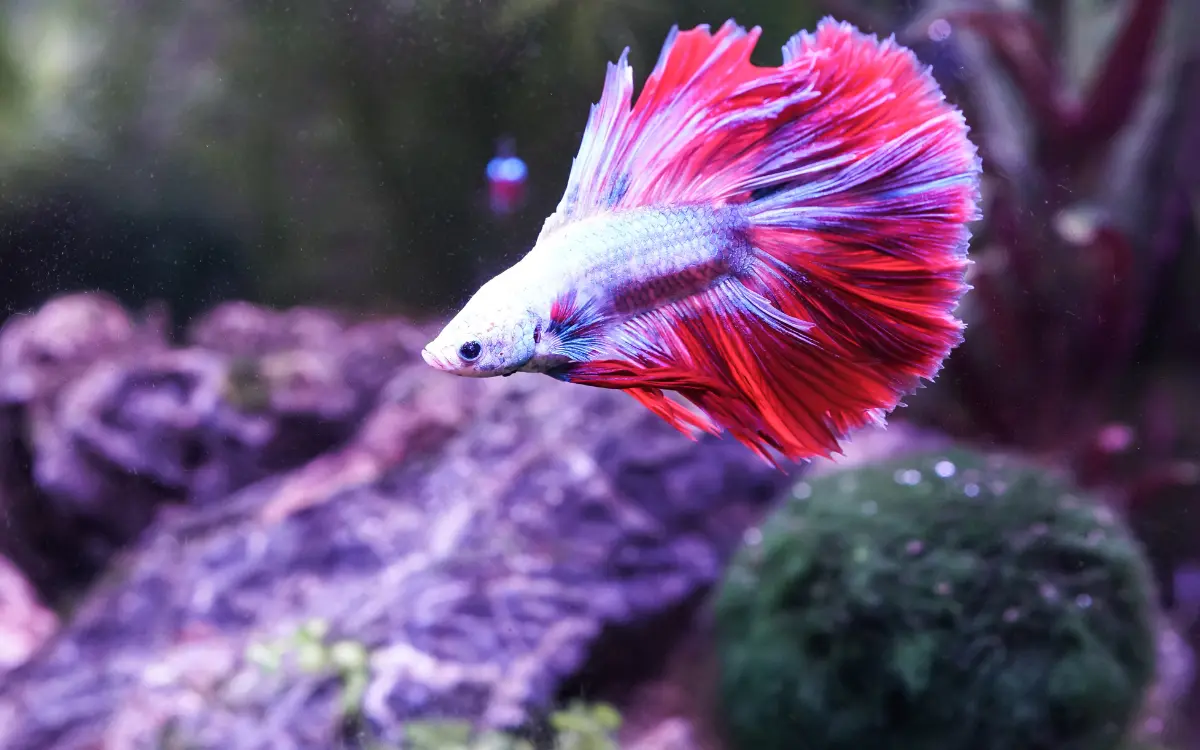No, Betta fish don’t need a filter to survive, but having one improves water quality, reduces maintenance, and helps create a stable, healthier environment, ultimately benefiting the fish’s health and well-being.
Understanding Betta Fish and Their Natural Habitat
Betta fish originate from shallow, slow-moving waters in Southeast Asia, like rice paddies and ponds.
In these low-oxygen environments, they’ve adapted with a labyrinth organ, allowing them to breathe surface air. Unlike their natural habitat, typical aquariums lack the same water flow and plant life, which can lead to poorer water quality.
Thus, while Bettas can survive in still water, a gentle filter can help mimic better water conditions and maintain a healthier environment.
Benefits of Using a Filter in a Betta Tank
Using a filter in a Betta tank offers several benefits:
- Improved Water Quality: Filters remove waste, uneaten food, and toxins, helping keep the water cleaner and healthier for the Betta.
- Reduced Maintenance: With a filter, water changes are needed less often, as the filter continuously cycles and purifies the water.
- Stable Environment: Filters maintain consistent water parameters, such as ammonia, nitrate, and pH levels, preventing sudden shifts that could stress the fish.
- Oxygenation: The water flow from a filter promotes oxygen exchange, improving overall water quality and supporting the Betta’s health.
Potential Downsides of Using a Filter in a Betta Tank
While filters provide benefits, they can also have downsides for Betta fish:
- Strong Water Flow: Bettas thrive in calm waters and may struggle with strong currents, making it hard for them to swim comfortably.
- Increased Stress: Filters that create excessive water movement can stress Bettas, leading to behaviors like hiding or avoiding areas with too much flow.
- Risk of Over-Filtration: Filters with high circulation rates can over-filter the tank, disturbing plants and decorations, and creating a stressful environment for the Betta.
Types of Filters Suitable for Betta Fish Tanks
Here are the types of filters suitable for Betta fish tanks:
- Sponge Filters: These provide gentle filtration, making them ideal for Betta tanks. They’re easy to clean and support beneficial bacteria that help break down waste.
- Internal Filters: Compact and low-flow, these filters work well in smaller tanks, offering a gentle current that’s less likely to stress Bettas.
- Hang-On-Back (HOB) Filters: These are good for larger tanks and often come with adjustable flow rates, allowing you to set a slower current that’s Betta-friendly.
- Canister Filters: Typically for larger setups, canister filters can be adjusted for lower flow, making them suitable for Bettas when set to a gentle setting.
How to Set Up a Filter for a Betta Tank?
Here’s how to set up a filter for a Betta tank:
- Choosing the Right Filter: Select a filter with an adjustable flow rate to control the water movement. Look for filters marketed as “Betta-friendly” or those with sponge or low-flow options.
- Adjusting the Flow Rate: Set the filter to a low flow or use baffles to reduce the current, ensuring the water movement is gentle enough for your Betta.
- Positioning the Filter: Place the filter in a corner or along the back wall, aiming the output towards a wall or decor to minimize direct flow in the Betta’s swimming area.
- Testing the Setup: Observe your Betta after setting up the filter. If the fish appears stressed (e.g., hiding or avoiding certain areas), make adjustments to the flow rate or positioning as needed.
How to Maintain a Filter in a Betta Tank?
Cleaning the Filter: Clean the filter every 2-4 weeks to remove debris and prevent clogs. Rinse filter components in tank water to avoid killing beneficial bacteria.
Replacing Filter Media: Replace filter media as needed, typically every 1-2 months, but do so gradually to maintain the beneficial bacteria colony. Alternate replacing media components if the filter has multiple stages.
Routine Water Testing: Conduct regular water tests to monitor parameters like ammonia, nitrite, and nitrate levels. This ensures the filter is effectively supporting a healthy environment for your Betta.
Signs Your Betta Fish May Benefit from a Filter
Cloudy Water: Persistent cloudy water indicates poor water quality, which a filter can help improve by removing waste and debris.
Fish Health Issues: Health problems like fin rot or lethargy can result from poor water conditions. A filter helps maintain stable parameters, promoting a healthier environment.
Excessive Algae Growth: Algae thrives on waste nutrients in the water. Filtration helps reduce these nutrients, keeping algae growth under control and improving overall tank cleanliness.
Alternative Solutions if You Don’t Want to Use a Filter
Frequent Water Changes: Perform partial water changes every 3-4 days to keep water quality high, replacing about 25-30% of the water each time.
Live Plants: Add live plants like Java moss or Anubias, which help absorb toxins, improve oxygen levels, and maintain a balanced ecosystem.
Low Stocking Levels: Keep only one Betta in the tank and limit decorations to reduce waste buildup, making it easier to manage water quality without a filter.
Conclusion
A filter can enhance water quality, reduce maintenance, and stabilize a Betta tank. However, it may cause stress due to strong currents. For larger tanks, a gentle filter is ideal, while smaller setups can work filter-free with regular water changes and live plants. Choose based on your tank size and Betta’s needs.

